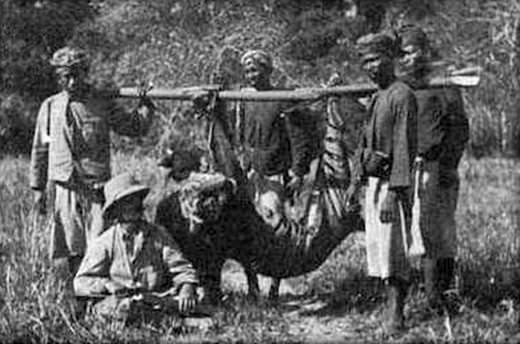Bali Tiger

Extinct 1937
The famous Bali tiger is now an extinct subspecies that was found only on the island of Bali in Indonesia. It became the first tiger to go extinct in recent years and one of three subspecies that make up the tigers of Indonesia. Of the three, only the Sumatran tiger remains and it is dangerously close to becoming extinct itself. There was a close relationship between the Bali and Java Tigers which were probably one group until separated at the end of the last ice age when the oceans split apart the islands of Bali and Java. However, given the relatively narrow straits it is certainly possible that the tigers swam across on occasion.
Of the nine known subspecies of tigers, the Bali tier was the smallest and was about the size of a typical cougar or leopard. Males weighed about 200 pounds and were roughly 7 feet in length while females were smaller at roughly 150 pounds and just under 7 feet in length if you include the tail. Sporting short fur that was a dark orange and relatively few stripes, the most distinguishing features was the bar-type patterns on the head of the animal. Their underbellies sported white fur that really stood out more than any other tiger in existence because of their very dark orange fur on top. The curved line of the Bali tiger helped make it appear more graceful than some of its counterparts.
Habitat
Bali tigers lived in the forested areas of the island which limited their movements considerably. Their main sources of food were a number of creatures that lived on the island which included, but not limited to the following: Wild Boar, Rusa Deer, Indian Muntjac, Red Junglefowl, Monitor Lizards and Monkeys.
The Banteng which is also now extinct may have been prey for the tiger as well. The only predator of the tiger was humans who hunted them mostly for sport.
Reason for Extinction
The last known Bali tiger was killed on September 27th, 1937 which was a female. However, it is believed that the species itself lasted for another ten to twenty years after that incident before dying out. Although the Dutch who came to the island during the Colonial period did great destruction to their population due to their hunting methods, the natives on the island also hunted the tiger frequently as it was perceived as a dire threat.
There were a number of separate reasons that led to the extinction of the Bali tiger. The relatively small size of the island combined with the large hunting radius the tiger needed for food was arguably the most pertinent reason. Add to this the increase in human habitation combined with hunting the tiger helped push it to extinction. However, it must be noted that the limited amount of forestation on the island combined with the relative small size meant that the population of the Bali tiger was fairly small even before humans first arrived on the island.